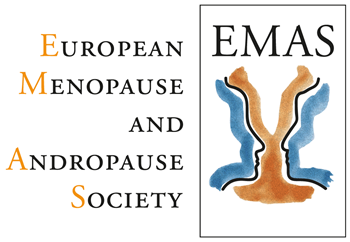Intro: Women gain on average 10 kilogrammes between the ages of 40 and 60 years, independently of menopause. Lifestyle factors such as nutrition and physical activity have profound effects on health and menopause symptoms.
Understanding how menopause impacts various aspects of health is crucial for creating a supportive workplace.
This podcast episode, brought to you by the European Menopause and Andropause Society (EMAS), features Dr Elena Armeni discussing how lifestyle factors like nutrition and physical activity can influence weight gain and menopause symptoms. Let’s dive into today’s discussion.
Dr Elena Armeni: The discontinuation of ovarian function, whether spontaneous or induced, is associated with a change in hormone levels. Predominantly, a drop in oestrogen levels and an apparent increase in androgen levels. This change in hormonal milieu is known to be related to the loss of the menstrual cycle, the occurrence of hot flashes and night sweats, the complaints of urogenital atrophy, but also mood and sleep disorders. This hormonal shift also increases cardiovascular risk and contributes to weight gain, as well as changes in body composition, including increased total fat, especially in the abdomen, and reduced lean muscle mass.
Menopause and ageing also lead to lower physical activity, further decreasing energy expenditure and muscle mass, which contributes to weight gain. This weight gain is linked to a higher risk of insulin resistance, type 2 diabetes, and cardiovascular disease. Additionally, a woman’s baseline weight at the time of the menopausal transition can influence her future cardiovascular risk.
As metabolism naturally slows down with age, focusing on a balanced diet and regular physical activity becomes even more crucial. To lose weight effectively, adopting a sustainable eating plan is key. In this context, the Mediterranean diet, rich in fruits, vegetables, whole grains, and healthy fats like olive oil, is particularly beneficial, as it supports heart health and can help with weight management.
The ketogenic diet, which is low in carbohydrates and high in fat, may promote rapid weight loss. However, it requires careful monitoring due to its restrictive nature. Intermittent fasting, which involves cycling between periods of eating and fasting, can also aid weight loss by helping to control calorie intake. Each of these diets has its merits, but it’s important to choose an approach that fits your lifestyle and nutritional needs, ideally with guidance from a healthcare professional.
Here are some points for consideration regarding a healthy diet. First, increasing the intake of fruits and vegetables is crucial. These foods are low in calories but high in fibre, vitamins, and minerals, which help in maintaining satiety and promote overall health. Fibre, in particular, is beneficial as it aids digestion, reduces hunger, and can help manage blood sugar levels, which is important during menopause due to the increased risk of insulin resistance.
Incorporating lean proteins such as fish, poultry, beans, and legumes supports muscle mass, which tends to decrease with age. Maintaining muscle is vital for preserving metabolic rate as muscle tissue burns more calories than fat, even at rest. Including protein in every meal can also help in controlling appetite and preventing overeating. Whole grains, such as oats, quinoa, and brown rice, should replace refined carbohydrates like white bread and pasta. Whole grains provide sustained energy and are less likely to cause spikes in blood sugar, reducing the likelihood of cravings and subsequent weight gain.
Limiting the intake of processed foods, which are often high in unhealthy fats, sugars, and sodium, is also important. These foods contribute to weight gain and can exacerbate menopause symptoms like bloating and mood swings. Additionally, healthy fats, such as those found in avocado, nuts, and olive oil, should be part of the diet. These fats are essential for hormone production and can help reduce inflammation, which is often heightened during menopause. By focusing on a balanced diet rich in whole, unprocessed foods, women can effectively manage their weight and support overall health during and after menopause.
In any case, to maintain a healthy weight, physical activity plays a pivotal role during and after menopause. Engaging in regular activity not only helps counterbalance the effects of menopause on body fat distribution but also offers additional health benefits such as improved cardiovascular health, stronger bones, and enhanced mood.
For effective weight management, a combination of aerobic exercises and strength training is recommended. Aerobic activities such as brisk walking, swimming, cycling, or dancing help burn calories and improve cardiovascular fitness. Experts suggest aiming for at least 150 minutes of moderate-intensity aerobic exercise per week, which can be broken down into 30-minute sessions five times a week. This level of activity can help prevent weight gain and contribute to weight loss when combined with a healthy diet.
Strength training is equally important, particularly as muscle mass naturally decreases with age. Incorporating strength training exercises like weight lifting, resistance band exercises, or bodyweight exercises such as squats and push-ups at least two days a week helps maintain and build muscle mass. Increased muscle mass not only boosts metabolism but also supports bone density, reducing the risk of osteoporosis. Flexibility and balance exercises, such as yoga or Pilates, can complement aerobic and strength activities. These practices enhance overall physical function and can prevent falls, which become more common as the body ages.
Consistency is key in any diet and exercise regimen. To maintain motivation, it’s beneficial to choose meals and plan activities that are enjoyable and to vary the types of exercises performed. Consulting a healthcare professional before starting any new exercise programme or diet is advisable to ensure the activities and meal plans are appropriate for the individual’s health conditions and fitness levels.
Thank you very much.


